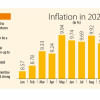IMF cuts GDP growth forecast for Bangladesh again

The International Monetary Fund (IMF) has further revised down the growth forecast for Bangladesh's economy for the ongoing fiscal year owing to persisting global and local challenges, including higher inflation.
The Washington-based lender said the economy would grow by 5.7 percent in 2023-24, lower than the 6 percent forecast in October. The gross domestic product (GDP) projection was 6.5 percent initially.
The GDP growth will rebound to 6.6 percent in 2024-25, said the IMF in its World Economic Outlook yesterday.
The downward revision for the current fiscal year comes although the IMF raised its outlook for the global economy for 2024, while maintaining a gloomy forecast over the medium term.
The lender expects the world economy to grow by 3.2 percent this year, up 0.1 percentage point from its previous forecast in January, and by a further 3.2 percent in 2025.
Last week, state-run Bangladesh Bureau of Statistics said economic growth halved to 3.78 percent in October-December of FY24, the slowest pace of expansion in three quarters, as manufacturing output growth declined sharply owing to reduced domestic consumption.
The government also cut its growth projection earlier this month to 6.75 percent from 7.5 percent set at the beginning of the fiscal year in July.
The World Bank has forecast Bangladesh's real GDP growth to remain relatively subdued at 5.6 percent in FY24, compared to the average annual growth rate of 6.6 percent over the decade preceding the Covid-19 pandemic.
The Asian Development Bank, however, has projected a 6.1 percent economic growth rate. The forecast is higher than the 5.8 percent expansion estimated for FY23. It may go up to 6.6 percent in FY25, the Manila-based lender said.
Among the South Asian countries, the IMF has projected a 6.8 percent GDP growth for India, 2 percent for Pakistan, 5.2 percent for the Maldives, 4.3 percent for Bhutan, and 3.1 percent for Nepal.
Since the Russia-Ukraine war broke out in February 2022, Bangladesh has been experiencing economic crisis due to escalated prices of global commodities since the country's foreign currency reserves depleted fast amid higher import bills.
The recent Middle East tension is also hurting the economy as the dollar crunch shows no signs of disappearing, forcing the Bangladesh Bank to maintain import restrictions, squeezing supply.
The IMF report projected that Bangladesh's inflation will stay above 9.3 percent in the current fiscal year, which ends in June. The inflation may decelerate to 6.1 percent in FY25.
The 9-plus percent inflation in the last fiscal year as well as in the first nine months of FY24 means the buying power of a majority of the people in the low-middle-income nation and the overall demand have remained under pressure, handing a blow to the country's growth aspiration.
The WB said the relatively slower growth is driven by a modest recovery in private consumption supported by a moderation in inflation.
Persistent inflation is expected to weigh on private consumption growth, and shortages of energy and imported inputs combined with rising interest rates and financial sector vulnerabilities are expected to dampen investor sentiment, it said.
Despite weaker global demand, exports of Bangladesh's traditional low-end garments will continue to grow as exporters use local yarn and fabrics amid the lingering dollar crisis, the ADB said.
The development lender projects that average inflation will moderate to 8.4 percent in FY24 and enable private consumption to grow.
The government has targeted to limit the average inflation to 7.5 percent by June. The Consumer Price Index surged to a 12-year high of 9.02 percent in the previous financial year, both for external and internal factors.

 For all latest news, follow The Daily Star's Google News channel.
For all latest news, follow The Daily Star's Google News channel. 








Comments